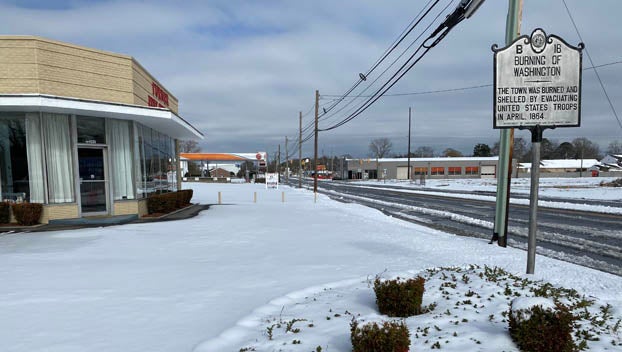Gov. Stein, emergency management officials encourage caution during extreme cold weather
Published 2:25 pm Wednesday, January 22, 2025
|
Getting your Trinity Audio player ready...
|
As much of the coastal, eastern, and central regions of North Carolina experienced snow and record cold temperatures, Governor Stein and emergency management officials are continuing to urge the public to exercise caution.
“The State Emergency Response Team remains activated today due to snow and the extreme cold temperatures,” said Governor Josh Stein. “We are asking all North Carolinians to exercise caution after last night’s snowfall and today’s below-freezing temperatures. As much as possible, avoid long exposure outside while these conditions persist and monitor your local government’s website and social media accounts for more information.”
North Carolina’s coastal region recorded 3-6 inches of snowfall, with parts of northeastern North Carolina reporting up to 9 inches. Farther inland, 1-3 inches of snow accumulation was reported across portions of central North Carolina. A Cold Weather Advisory remains in place for much of the state today with an Extreme Cold Warning in effect today for the northwest mountains. Additional Cold Weather Advisories are likely to go into Thursday morning across much of the state. Warming centers have been opened in Brunswick, Columbus, Gates, New Hanover, and Orange Counties.
Hazardous roadway conditions will likely linger in places where wintry precipitation fell throughout much of the work week. NC DOT is working around the clock to plow and treat snow and ice until all state-maintained roads are cleared. Over 1300 trucks, as well as 3.67 million gallons of brine, have been deployed for pre-treating and de-icing efforts. The State Highway Patrol addressed 560 vehicle crashes overnight and reported no weather-related fatalities. If driving, use extra caution, reduce your speed and allow plenty of space between you and vehicles around you. If you spend time outdoors, be sure to wear multiple, loose-fitting layers and take plenty of breaks indoors to avoid dangers of exposure to cold temperatures.
“It is important to remember that below freezing temperatures will remain for the next few days. Any snowfall that does melt will refreeze each evening,” said Emergency Management Director Will Ray. “If you do not need to be on the roadways today, please stay home for your safety and for the safety of first responders and NC DOT working to clear the roads.”
If you must travel in winter weather-affected areas, the North Carolina State Highway Patrol advises:
- Reduce your speed and allow significant following distance. Operating a vehicle well below the speed limit will help drivers’ ability to maintain control of their vehicle on slick roadways.
- Bridges and overpasses pose a significant hazard with refreezing. These areas tend to be the first to freeze during winter weather events and continue to impact travel after a storm has passed. Decrease speed prior to a bridge and avoid braking once directly on a bridge.
- If you do begin to slide, take your foot off the gas, gradually turn the steering wheel in the direction of the slide, and DO NOT push the brakes as that will cause further loss of control of your vehicle.
Cold Weather Safety Tips:
- Stay indoors during the storm.
- Walk carefully on snowy, icy walkways.
- Do not over-exert yourself when shoveling snow, as overexertion can bring on a heart attack.
- Keep dry and change wet clothing often to protect your body heat, as wet clothing does not keep your body insulated.
- Wear layers of thin clothing to stay warmer. You can easily take off layers to stay comfortable.
- Wear a hat. Most body heat is lost through the top of the head.
- Cover your mouth with scarves to protect lungs from directly breathing in extremely cold air.
- Watch for signs of frostbite. These include loss of feeling and a white or pale look of fingers, toes, ear lobes, and the tip of the nose. If you see these symptoms, get medical help.
- Watch for signs of hypothermia. These include uncontrollable shivering, memory loss, disorientation, incoherence, slurred speech, drowsiness, and visible exhaustion. If you see these symptoms, get the person to a warm place. Take off wet clothing. Warm the center of the body first. Give the person warm, non-alcoholic drinks if they are conscious. Get medical help as soon as you can.
- Maintain proper ventilation when using kerosene heaters as to not build up toxic fumes. Refuel kerosene heaters outside. Keep them at least three feet from flammable objects.
- Conserve fuel, if necessary, by keeping your home cooler than normal. For the time being, close off heat to some rooms.
- Keep fire extinguishers on hand. Make sure your family knows how to use them. Know fire prevention rules.
- If you will be going away during cold weather, leave the heat on in your home. Set the temperature no lower than 55ºF.






